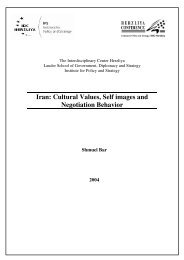Bashar's Syria: The Regime and its Strategic Worldview Shmuel Bar ...
Bashar's Syria: The Regime and its Strategic Worldview Shmuel Bar ...
Bashar's Syria: The Regime and its Strategic Worldview Shmuel Bar ...
You also want an ePaper? Increase the reach of your titles
YUMPU automatically turns print PDFs into web optimized ePapers that Google loves.
Bashar’s <strong>Syria</strong> 397<strong>The</strong> Christian community in <strong>Syria</strong> numbers about one million, about 6.5 percent of thepopulation. It is split into a number of sects. <strong>The</strong> sense of disintegration of authority in <strong>Syria</strong><strong>and</strong> the revival of the Assyrian community in Iraq ignited demonstrations by the AssyrianChristians in the city of Hasakah. In October 2004, thous<strong>and</strong>s of Assyrians protested thekilling of two Assyrians by Muslims, who accused them of supporting the Americans.Developments in Iraq have also affected the relations between <strong>Syria</strong>’s Christian Assyrians<strong>and</strong> the regime. <strong>The</strong> identification by <strong>Syria</strong>n Sunnis of the Assyrians with the U.S. in Iraqhas generated anti-Assyrian sentiment in <strong>Syria</strong>.<strong>The</strong> Kurds in <strong>Syria</strong> are second-class citizens. <strong>The</strong> regime’s attitude toward the twomillion-strongKurdish minority in the northeastern Hasakah province is symptomatic of<strong>its</strong> practice of raising hopes <strong>and</strong> then dashing them. Since Bashar came to power, theregime has made some overtures toward the Kurdish community, among them signalingthat a rectification of historic grievances may be in sight. Bashar himself visited Hasakahin 2002—the first such visit of the president ever.<strong>The</strong> rise of the Kurdish factor in Iraq had an effect on the Kurds in <strong>Syria</strong>. In March2004, a brawl between fans of Kurdish <strong>and</strong> Arab football teams in the northern Kurdishregion of Hasaka set off a tide of unrest that developed into widespread Kurdish antiregimeviolence, which spread to the Kurdish quarter of Damascus <strong>and</strong> the University of Damascus.Another significant incident that heightened the tensions between the regime <strong>and</strong> the Kurdswas the disappearance, apparent arrest, <strong>and</strong> subsequent death (apparently due to torture) ofthe eminent Kurdish Sheikh Mohammad Ma’shuq al-Khiznawi (May 2005), who had beenactive in calling for reforms in <strong>Syria</strong>.<strong>The</strong> Kurdish protests erupted against a historical background of discrimination againstKurds, including the constant refusal of the regime to accord <strong>Syria</strong>n citizenship to hundredsof thous<strong>and</strong>s of Kurds living in that region, <strong>and</strong> who were, according to the regime, of Iraqiorigin. Before the June 2005 Ba’th Party Congress, the regime allowed Kurdish groups tofield papers that would grant equal rights to Kurds, <strong>and</strong> particularly accord citizenship toabout 200,000 Kurds inside <strong>Syria</strong> who lack any citizenship (al-maktumin). <strong>The</strong> Congressdid not finally discuss the issue. In the wake of the pressures on <strong>Syria</strong> as a result of theMehlis report on the al-Hariri affair, <strong>Syria</strong>n Ba’th officials have been reviving the possibilityof enfranchisement of the stateless Kurds of <strong>Syria</strong>. 111Nevertheless, the options for these minorities are between an Alawite-led regime inwhich they have some stake <strong>and</strong> a Sunni—potentially Islamic-Salafi—regime that would bemuch more inimical to their interests. Fear of Sunni rule, which motivated their participationin the Ba’th regime’s coalition, seems to have increased because of events in Iraq. Hence,while there have been outbreaks of sectarian violence between Alawites <strong>and</strong> Isma’ilis, <strong>its</strong>eems that these minorities remain loyal to the regime, at least according to the slogan notedabove: ma fi gheiru—there is nothing else.Civil SocietyA civil society may be defined for the purposes of this study as voluntary social or politicalassociation within a “space” in a country that is not controlled by the government, <strong>and</strong>which is democratic <strong>and</strong> tolerant in that it is not exclusive; it accepts that organizationswith different values <strong>and</strong> interests all operate within the same space. <strong>The</strong> Ba’th regimewas in total control over the entire public space, relying on intimidation <strong>and</strong> deterrence tomaintain <strong>its</strong> hold over society, but did not really invest in mass ideological indoctrination.Like Machiavelli, Asad knew that it was better to be feared than to be loved.
















